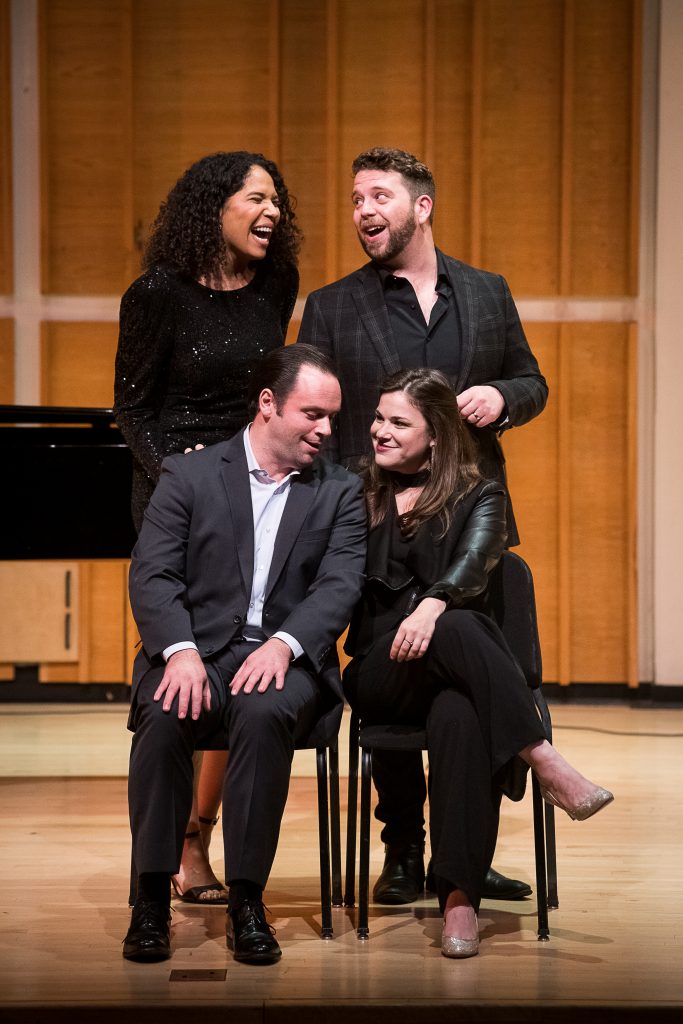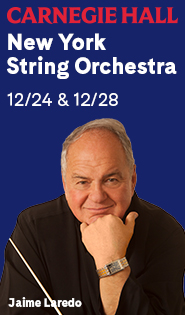An emotional year is reflected in the return of New York Festival of Song

To the list of familiar New York sights coming back in this vaccinated time, we can now add Steven Blier at the piano as a gaggle of young singers delivers songs of all styles and eras.
The New York Festival of Song, founded by Blier and pianist Michael Barrett in 1988, emerged from a year of online-only existence onstage at Merkin Concert Hall Tuesday night, with an arresting program of intimate expression over an even-wider-than-usual range of emotions. Blessedly, in the small venue, no microphones were needed or wanted.
This series is known for programs designed around a theme—Spanish Love Songs, Come Home America, and so on. As he wrote in a program note, Blier was stumped for a topic that could address even a small fraction of what the world had been through over the last year and a half. So he titled Tuesday’s program simply, “And…We’re Back!”
That raised the question, back from what? The answer, at least for this evening, was a mosaic of 16 songs, arrived at in sometimes-protracted consultation with the singers, each probing some aspect of living in a time of personal loss, political upheaval, and rage for justice.
A parting song for two lovers, the 1945 Carl T. Fischer/Frankie Laine classic “We’ll Be Together Again,” led off the program on an intimate and somber (or at least sober) note, especially in the introspective rendering by mezzo-soprano Amanda Lynn Bottoms.
But by evening’s end, the personal became universal as the entire cast of five singers joined in the 1869 hymn “How Can I Keep From Singing?” with the repeated line “Above the tumult and the strife/I can hear its music ringing.”
Along the way, Bottoms returned with another intimately crafted song, Errollyn Wallen’s “My feet may take a little while,” then shifted gears into a spirited habanera about social justice in Cuba, the 1932 “Lamento esclavo” (Slave’s Lament) by Eliso Grenet and Aurelio G. Riancho. In the latter, Blier’s piano accompaniment was enhanced by percussionist Leonardo Granados on small hand drum and rattle.
In an evening of singers stretching themselves stylistically, mezzo-soprano Rebecca Jo Loeb showed exceptional range, beginning with a sad-sack comic turn in Jerry Lieber’s and Mike Stoller’s “Ready to Begin Again,” an anthem of pulling oneself together to start the day, recorded by Peggy Lee in 1975.
Loeb turned both melancholy and flirty in the Bossa Nova-colored “Chega de saudade” (Enough of missing you) by Antonio Carlos Jobim, gently propelled by the elegant guitar playing of Rupert Boyd and by percussionist Granados, coaxing seductive sounds from just a wood box, a brush and fingertips.
Later Loeb uncannily channeled the vocal style of Joni Mitchell–those almost yodeling leaps from purring low range to flute-like head voice–in the Canadian singer-songwriter’s 1968 song of loneliness and freedom, “Cactus Tree.” Tenor Paul Appleby accompanied Loeb on guitar, adding discreet vocals here and there.
As the evening progressed, the spotlight shifted toward the two male singers and a newcomer to the series, mezzo-soprano Maggie Reneé. The sturdy-voiced baritone Johnathan McCullough slyly introduced himself with a soft, country-style ballad, Glen Hansard’s “Song of Good Hope.” Gently strumming his guitar, McCullough put a little twang into his message of love and encouragement.
The baritone tenderly inflected the bluesy adagio “Litany,” John Musto’s 1986 setting of Langston Hughes’s poem of compassion for the poor. But the restraints came off as McCullough swaggered through Cole Porter’s 1941 song “Dream Dancing,” singing with ecstatic power as pianist-arranger Blier, syncopations flashing and fingers flying, seemed to be dreaming of dancing with Art Tatum.
Tenor Appleby–fresh from the cast of Die Meistersinger at the Met, where he sang David, the amorous apprentice–set down his guitar (and Wagner) to put a tender jazz styling on “Love Sublime,” a 2006 setting by Brad Mehldau of a poem by Fleurine. The published song preserved Mehldau’s improvised, almost Schubertian introduction and flowing piano interlude, which Blier rendered Tuesday with reverence and verve.
Appleby next turned to echt Schubert, in that composer’s “Abendlied für die Entfernte” (Evening song for the distant beloved) of 1825, his singing a model of clear tone, melodious phrasing, and projection of the text. The mood shifted subtly, from smiling through the dark to yielding to it, as Appleby softly intoned Mahler’s 1901 song “Ich bin der Welt abhanden gekommen” (I have become lost to the world). The message of courage and solace from the old lieder masters to our time could not be missed.
Maggie Reneé made her bow in a lied with a different message, Brahms’s exuberant “Meine Liebe ist grün” (My love is evergreen) of 1873, to a text by Robert and Clara Schumann’s son Felix. Reneé’s full-out classical vocalism, ripe with vibrato and gleaming high notes, came as a relief late in a mostly-introspective program.
But Reneé too showed she could curl a phrase in the chanteuse manner in “At telchi basade” (You will walk in the field), composed around 1970 by Chaim Barkani to Hebrew lyrics by Leah Goldberg. A minor-key, Middle-Eastern-inflected flow in Blier’s piano supported her confiding, sinuous vocal line.
The program’s “hot closer,” the crackling duet/quartet “You’re Gonna Love Tomorrow/Love Will See Us Through” from Stephen Sondheim’s Follies (1971), paired off Bottoms with McCullough and Loeb with Appleby as sets of chattering newlyweds brought together at the end in a contrapuntal tour de force, executed with whip-smart timing throughout.
After the hymn finale, the cast gathered around Blier at the piano, who offered a solo encore, his florid jazz arrangement of David Raksin’s “Love Is for the Very Young,” the theme song for the movie The Bad and the Beautiful. In its emotional ambiguity, the song spoke to not only the story of the 1952 film, but the moment we are living in.
The New York Festival of Song’s next program will be “Buenos Aires, Then and Now,” Feb. 15, 2022 at Merkin Concert Hall. nyfos.org; 646-230-8380.

